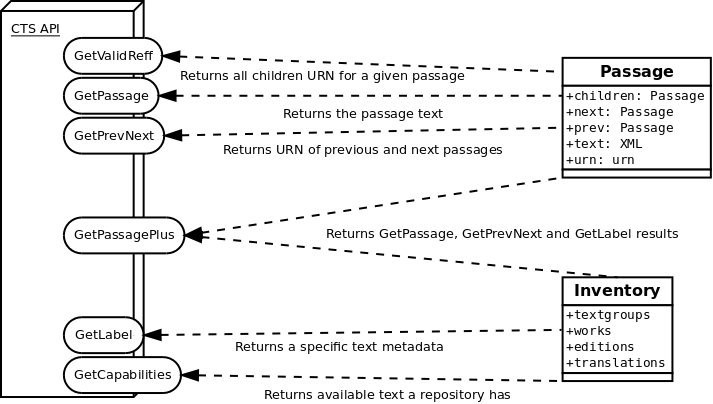Vocabulary
CTS concepts equivalency table
This table has been written by B. Almas and H. Cayless in the context of the Distributed Text Services efforts.
| CTS | LAWD | FRBR | Concept | Notes |
|---|---|---|---|---|
| Namespace | N/A | N/A | Naming Authority, Collection | The intent of the CTS namespace was to serve as a naming authority for a set of CTS URN identifiers in order to be able to declare uniqueness of all textgroup identifiers only within the scope of a given namespace. In practice, this has been interpreted mainly as a Collection or Corpus identifier. |
| Textgroup | N/A | N/A | Collection, Author/logical grouping | an identifier for any group of texts that are conventionally cited together in the naming authority’s tradition |
| Work | ConceptualWork | Work | Abstract Work | |
| Version | WrittenWork, Edition | Expression | Digital Edition | According to LAWD, an “Edition” is a published version of a WrittenWork; I think this might correspond more closely to the CTS concept of “Version” than just WrittenWork because a CTS Version is a distinct publication of an expression of a Conceptual Work |
| Edition | Written Work, Edition | Expression | Digital Edition | a CTS Edition is a type of a CTS version, with the restriction that it must be an expression of a work in the original source language of the work |
| Translation | Translation | Expression | Digital Edition | a CTS Translation is a type of a CTS version, with the restriction that it must be an expression of a work in a different language than the original source language of the work |
| Exemplar | n/a | Item | Derived Resource | The HMT has been using Exemplars to represent specific derivations of a CTS version created for the purpose of analysis and unambiguous citation at the level of the token. E.g. a tokenization by morphemes. This might be more of a derivation than an interpretation but it has elements of both. |
| Passage | Citation | N/A | Resource Fragment | a CTS Passage identifies a singe citable section of a work - it might be a single “node” or a range of “nodes” |
CTS Request Diagram
